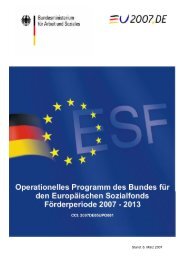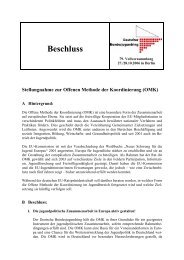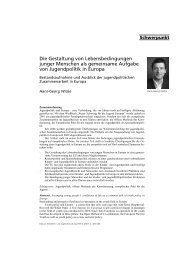6 Country Reports on Youth Work - Jugendpolitik in Europa
6 Country Reports on Youth Work - Jugendpolitik in Europa
6 Country Reports on Youth Work - Jugendpolitik in Europa
You also want an ePaper? Increase the reach of your titles
YUMPU automatically turns print PDFs into web optimized ePapers that Google loves.
6.10 Spa<strong>in</strong><br />
To understand the mean<strong>in</strong>g of youth work <strong>in</strong> the Spanish welfare state it is essential, <strong>on</strong> the<br />
<strong>on</strong>e hand, to understand the focus <strong>on</strong> the family envir<strong>on</strong>ment which characterises young<br />
peoples’ transiti<strong>on</strong> processes to adulthood and which also permeates public policies. This is<br />
equivalent to say<strong>in</strong>g that the Spanish welfare state has until now been based <strong>on</strong> solidarity,<br />
particularly cross-generati<strong>on</strong>al solidarity, which expla<strong>in</strong>s young people’s delayed<br />
emancipati<strong>on</strong> from their family. Issues relat<strong>in</strong>g to the socialisati<strong>on</strong> of young people are<br />
normally solved with<strong>in</strong> the family (private envir<strong>on</strong>ment), while issues relat<strong>in</strong>g to young<br />
people´s school<strong>in</strong>g and labour qualificati<strong>on</strong> are solved with<strong>in</strong> the educati<strong>on</strong>al system (public<br />
envir<strong>on</strong>ment). This expla<strong>in</strong>s why family-oriented southern European welfare state policies<br />
and youth work activities tend to be underdeveloped. Moreover, these welfare states are<br />
characterised by a polarised revenue policy essentially directed towards the elderly, where<br />
budgetary allocati<strong>on</strong>s <strong>in</strong>tended for family and for youth policies, such as for the development<br />
of youth work, have been very scarce. This has c<strong>on</strong>siderably restricted the development of<br />
nati<strong>on</strong>al programmes for youth work, restrict<strong>in</strong>g the development of these programmes to a<br />
local level. On the other hand, and as a c<strong>on</strong>sequence of this family orientati<strong>on</strong> that<br />
characterises the southern European welfare states, welfare and socialisati<strong>on</strong> assistance<br />
have to be provided with<strong>in</strong> the private family envir<strong>on</strong>ment. Policies <strong>in</strong>tended to promote the<br />
third sector and n<strong>on</strong>-formal educati<strong>on</strong> of young people have just recently been implemented.<br />
This has had certa<strong>in</strong> negative repercussi<strong>on</strong>s <strong>on</strong> the shap<strong>in</strong>g and <strong>in</strong>troducti<strong>on</strong> of the c<strong>on</strong>cept<br />
of youth work.<br />
In the case of the southern European welfare states there is no official term or underly<strong>in</strong>g<br />
c<strong>on</strong>cept of youth work. In c<strong>on</strong>trast to the countries <strong>in</strong> northern Europe, <strong>in</strong> Spa<strong>in</strong> this c<strong>on</strong>cept<br />
is difficult to apply when referr<strong>in</strong>g to youth policies, s<strong>in</strong>ce there is an <strong>in</strong>stituti<strong>on</strong>al and<br />
c<strong>on</strong>ceptual void <strong>on</strong> the subject, which is reflected <strong>in</strong> a variety of youth programmes. In many<br />
cases youth work is understood as labour educati<strong>on</strong> policies developed at a local level and <strong>in</strong><br />
the third sector, policies <strong>in</strong>tended to promote the labour <strong>in</strong>serti<strong>on</strong> of disadvantaged young<br />
people. The mean<strong>in</strong>g of youth work <strong>in</strong> Spa<strong>in</strong> is therefore fundamentally exemplified <strong>in</strong> youth<br />
policies <strong>in</strong>tended to counteract the social exclusi<strong>on</strong> and marg<strong>in</strong>alisati<strong>on</strong> of young people.<br />
The ma<strong>in</strong> goal of youth policies with regard to youth work is to strengthen the participati<strong>on</strong><br />
and <strong>in</strong>tegrati<strong>on</strong> of young people <strong>in</strong> different spheres of society as citizens with full rights. As<br />
clearly stated <strong>in</strong> the YOYO project (2004), current policy discourses <strong>in</strong> Europe promote<br />
participati<strong>on</strong> as a key pr<strong>in</strong>ciple of civil society. However, if participati<strong>on</strong> is not l<strong>in</strong>ked to social<br />
rights - with the excepti<strong>on</strong> of the universalistic transiti<strong>on</strong> system <strong>in</strong> the Scand<strong>in</strong>avian<br />
countries - it tends to <strong>in</strong>crease self-resp<strong>on</strong>sibility and <strong>in</strong>dividualises social risks. In particular,<br />
active labour market policies tend to underm<strong>in</strong>e and restrict <strong>in</strong>dividual aut<strong>on</strong>omy. However, if<br />
active citizenship is the democratic formula for self-determ<strong>in</strong>ati<strong>on</strong> with<strong>in</strong> flexible labour<br />
markets, <strong>in</strong>dividual motivati<strong>on</strong> is a valuable key for policy. From this perspective it is<br />
necessary to po<strong>in</strong>t out that <strong>in</strong> the southern European countries, and specifically <strong>in</strong> Spa<strong>in</strong>, the<br />
limited development by the welfare state of social policies referr<strong>in</strong>g to family and youth has<br />
had a certa<strong>in</strong> negative repercussi<strong>on</strong> <strong>on</strong> the formulati<strong>on</strong> of policy strategies and <strong>on</strong> citizens<br />
41

















